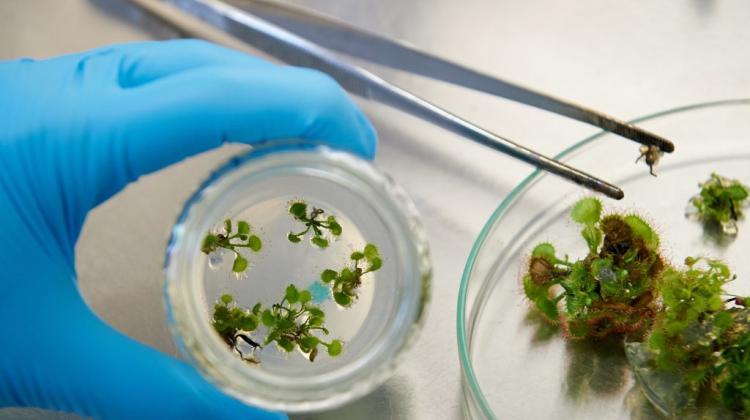Gdynia/ Scientists are recreating the bog in the Łeba Glacial Valley
 Photo: PAP 2016 / Adam Warżawa
Photo: PAP 2016 / Adam Warżawa
Researchers at the laboratory of the Pomeranian Science and Technology Park in Gdynia are working on restoring plants in a degraded peatland area in the Czarne Bagno reserve in the Łeba Glacial Valley. After the transfer to natural conditions, peat moss and sundews grown in vitro have adapted and develop.
Laboratory in the Pomeranian Science and Technology Park in Gdynia carries out the project "The cultivation of sphagnales in vitro in order to reintroduce them into degraded high bogs. Maintaining a sphagnum tissue bank and sundew seed bank from the area of Pomerania".
The researchers emphasise that the restoration of vegetation devastated by human activities plays an important ecological function, as bogs prevent droughts, fires and floods and contribute to water purification. They store more carbon dioxide than forests, which has a positive impact on air quality.
Head of the laboratory of the Pomeranian Science and Technology Park in Gdynia, Dr. Jolanta Grzenkowicz-Wydra explained that two years ago the laboratory joined the project carried out since 2006, attempting to recreate bog vegetation in the reserve Czarne Bagno. Earlier, the project was carried out, among others, by the University of Gdańsk.
She noted that the restoration of plant species on once degraded peat bog area is a multistep and long-term process. The laboratory develops technologies, methods of in vitro propagation of endangered species of sundew (Drosera) and peat moss (Sphagnum), typical for peat bogs, for their reintroduction to peat bog.
She reported that in a first step researchers obtained the wild material in the form of fragments of plants and sundew and sphagnum seeds, and then developed an efficient method of multiplication of plants in the laboratory.
"First, we collected fragments of plants on a bog. Approx. 20 percent of such material can be harvested without disturbing the equilibrium in the environment. We brought the material to the laboratory and developed special sterilization conditions" - she explained. Fragments of plants and seeds contain, among others, fungi and bacteria, making them unsuitable for use in an in vitro method. Approx. 10-20 percent seeds successfully pass the sterilization phase. "From these seeds small plants germinate and then begins our experimental work in the laboratory, the choice of medium, growth conditions" - she added. After a few months, for example after the winter, the plants in the laboratory are transplanted into aquariums containing peat. "When we are confident that the plant has acclimatized to the peat conditions and it is not infected with fungi, bacteria , thrives, we transplant it to experimental plot" - she explained.
The plants are planted and monitored by researchers in the reserve Czarne Bagno in the Łeba Glacial Valley. "Today we know that sundews acclimatized in natural conditions and produce new leaves" - she emphasised.
"For several years we have been able to perfectly replicate sundews; for two growing seasons we have been transplanting them into natural environment and the sundews survived" - she added.
She admitted that the scientists have less experience with peat moss. She said the peat moss planted last autumn survived the winter period, is in good condition and reproduces. "We can propagate it in laboratory conditions in vitro, but only after a full growing season we will be able to say more about how well these plants acclimatise in natural conditions" - she explained.
In Poland there are 36 species of sphagnum and not for each species it is possible to develop such conditions that it will grow in vitro. "The difficult moment is developing the medium composition, selection of appropriate nutrients and physico-chemical conditions like light exposure, temperature, humidity" - she explained.
Dr Grzenkowicz-Wydra admitted from scientific literature she only knows few cases of Sphagnum introduction on a massive scale.
She noted that for an introduction to be possible, water relations must be restored on the degraded peatland. "Our efforts will be futile if the ecosystem is not ready and conducive to proliferation, development of plants" - she added. This includes securing these areas against water drainage and pollution.
In the 1970s the bog in the reserve Czarne Bagno in the Łeba Glacial Valley was drained and peat operations started, which led to its heavy degradation. Researchers from the University of Gdańsk decided many years ago to restore the degraded ecosystem. The laboratory of the Pomeranian Science and Technology Park in Gdynia joined the project
The project is carried out with financial support of the Regional Fund for Environmental Protection and Water Management in Gdańsk. The total project cost is more than 318 thousand zlotys. The completion date is scheduled for December 2016.
The laboratory of the Pomeranian Science and Technology Park in Gdynia has a section specifically for work with plants grown in vitro. Phytotrons provide plants with constant temperature and exposure conditions (photoperiod), and the equipment allows to work under sterile conditions. The plants have the conditions for vegetation throughout the year.
PAP - Science and Scholarship in Poland
bls/ mhr/ mrt/
tr. RL
Przed dodaniem komentarza prosimy o zapoznanie z Regulaminem forum serwisu Nauka w Polsce.















